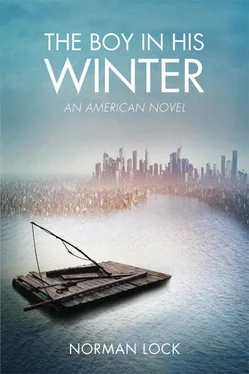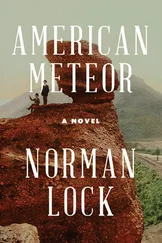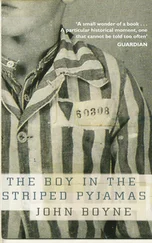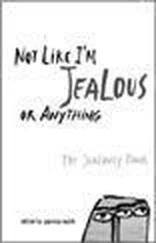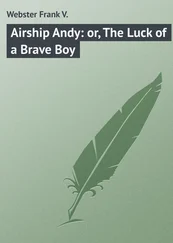The years passed: 1920, 1921, 1922, 1923, 1924, ’25, ’26, ’27, ’28, ’29, 1930. And in all that time, Henry aged no more than Jim or I, which was not at all.
“We’re far enough into the future for you to get off,” I said to Henry when Edgard, Louisiana, came into view around a bend. Jean Lafitte had favored the town’s rum and women with his swashbuckling presence. I doubted Henry would be welcomed with an equal warmth.
Jim took me aside and said we should wait a few more years; he didn’t think we’d given Homo sapiens nearly long enough to improve its low character. He thought the job of civilizing human beings was far too big to be accomplished in only a single decade.
“Give him another ten years,” Jim said. “What’s ten more years to us who never alter in time or feel the least inconvenienced by its passing?”
His concern for Henry hardened my heart. I pulled at the sweep oar until the raft scraped up onto a gravel beach, and then nodded to Henry, who understood and got off with his cornet. For a moment, I feared Jim would get off, too; but he remained aboard, although he turned his back on me — whether in disapprobation or disgust, I don’t know. I pushed the raft off the gravel into the river, and we were once again in the current. We spoke not a word while the river reasserted its influence. I looked over my shoulder at Henry, who shrank until there was nothing left of him but the sunlight on his horn. The sun vanished in clouds, perfecting Henry’s obliteration. The world seemed to have hushed, with only the “St. Louis Blues” to disturb the mournful silence. And when we had put the town behind us, Henry’s music was drowned in the noise of water and of the wind that blew with the force of history at our backs.
JIM WOULD NOT SPEAK TO ME, and the years passed in silence. I hated him and might have tried to knock him overboard if it were not for the feeling that my destiny was entangled in his. (I believed at the time that I had a destiny, separate and apart from what the river willed.) Could I go on without Jim? What would it mean for my life, for his to end? That he could have considered himself bound up in Henry Wilson’s fate didn’t occur to me — or if it did, I put it out of my mind as a complication beyond its power to unravel. Time slowed as though it meant to stop. I worried what it might mean to me if it did. Would the river, raft, and we two seize up, like a watch in whose works a bit of grit or rust has lodged? Jim did not speak to me, nor I to him. I longed for a scrap of conversation or even a bone of contention we could have gnawed aloud. I don’t mind silence so long as it is companionable. Standing at the sweep oar, I looked at Jim’s back as he sat well forward on the raft. When our positions were reversed, I looked at the river and its shores.
Let me describe once again the beauties of the way: There were swans toward shore that knotted behind them long threads of brown water; and herons standing on one leg, necks preening in the light or elongating suddenly to spear small fish flashing in the shallows; and pelicans straining at the oars of their wings; and geese that hurtled down from the upper air, flailing as they skidded to a stop on the face of the water. There were animals onshore drinking from the river and others on the headlands and in the hills. The trees on the hills and in the valleys and pastures beyond them were green or the color of old gold or, farther to the east, white — in their seasons. I knew how the land lay on either side of the great river that divided it. And I had it on good faith that the earth was rich and yielded ample harvests unless it was a time of drought or scorching heat or annihilating rains. But they, also, had their places in the shaping of the people’s character. So, too, the western desert and the northern plains and the smoking cities of the East. The river was not so wide as it was up above, but deeper — its depths communicating to me a knowledge of shoals and reefs and of other things hidden from view that give us fear and also hope: the one, that we will founder and drown; the other, that we will avoid — by luck or providence — the snares and continue on our way into a future that may be better than the past.
“He may have played his cornet in the town hall,” I said to Jim at last to break the silence.
He turned to me and said, “Yes, he may have taken the train to New York and played with Louis Armstrong and Fletcher Henderson or gone to Chicago to play with Jelly Roll Morton and King Oliver.” (The men’s names meant nothing to me, since, unlike Jim, I hadn’t “been to school” with Henry Wilson during his years on the raft.)
I’ve never known whether Jim was serious or sarcastic at that moment. In any case, the ice between us had broken, and we talked while we floated so very slowly downriver. But it was never the same again, and our talk was not easy or pleasant anymore. Time drained away like sand in an hourglass: a figure of speech that makes up for its unoriginality by its exactitude.
The years rolled on: 1940, 1941, 1942—there was another war, but we didn’t feel it—1945, 1950—and there was yet another war—1954, ’55, ’56, ’57, ’58, ’59. .
In 1960, Jim decided to leave the raft for good. We had been on the river for one hundred and twenty-five years.
WE PUT IN AT WAGGAMAN, on the west bank of the Mississippi. Jim took his pipe and several plugs of tobacco, the darning egg, the stovepipe hat, and The Pilgrim’s Progress . We shook hands formally and gravely. He left the raft. I watched him until he disappeared down a side street. I sat for a long time, wondering how it would be to go on without him. Twice, I attempted to gather myself together and push out onto the river, but I couldn’t. I smoked a pipe, drank a little whiskey, and wondered why Jim had taken the darning egg and not his petrified frog. In the end, I followed him into town.
My feelings at that instant — what I can recall of them from this remove in time and space — were complicated. I was bothered that I had come to hate him, bothered even more that I had loved him. I’m not sure that I regarded him then as a man. Not entirely. That broad view of humanity was alien to a mind that had been formed haphazardly, like a shack put together out of old lumber, warped and ill-used. There was about me then a makeshift quality. My nature was rough-hewn. I was cruel and envious because I was often afraid. I regretted I had not been more open with Jim. We’d wasted much time when we might have understood what was happening on the raft while we closed in on the river’s end, which was not to be the journey’s end, as I learned later. No, it was not even the end for Jim. I went on with him — we went on together — for a long time afterward.
Jim stopped at a house and knocked at the door. I watched him fumble off his hat when a bedraggled young woman stepped onto the porch. I was hiding in the bushes, and I heard him ask if there was any little job he could do. He needed money for a bus ticket, he said. He wanted to go to New York. I wished then that I had taken the coins from Tom Sawyer’s pocket so that I might give them to Jim. The woman looked at him with scorn and with something I couldn’t interpret.
“I got an old chifforobe needs busting up for kindling,” she said.
“I’d be pleased to do that for you, ma’am.”
“You can call me Mayella,” she said, giving him that disquieting look again.
Sensing in her what I could not, Jim began to back up on the porch. But the woman insisted and took his arm and dragged him into the house. Shortly after, I saw him carry the chifforobe into the yard and chop it up with an ax while Mayella stood and watched.
Finished his work, Jim asked politely to be paid, but the girl wasn’t ready to see him leave.
Читать дальше
